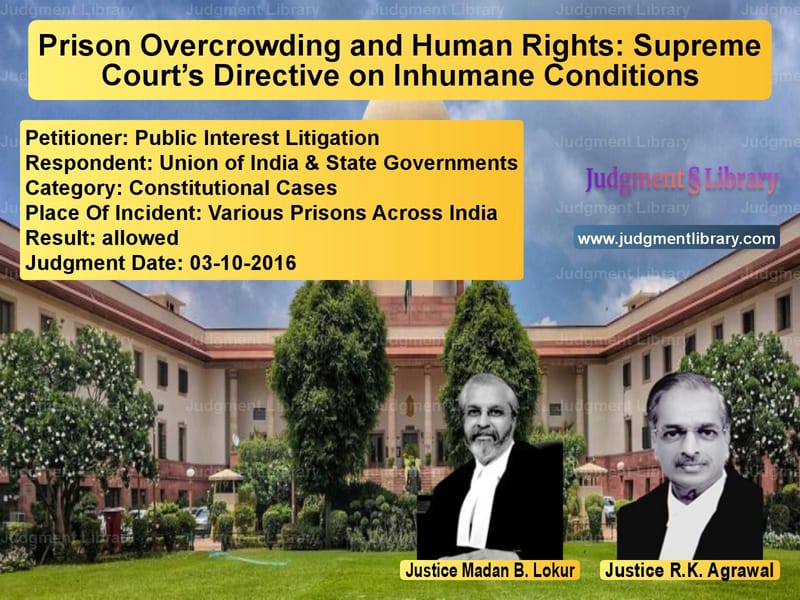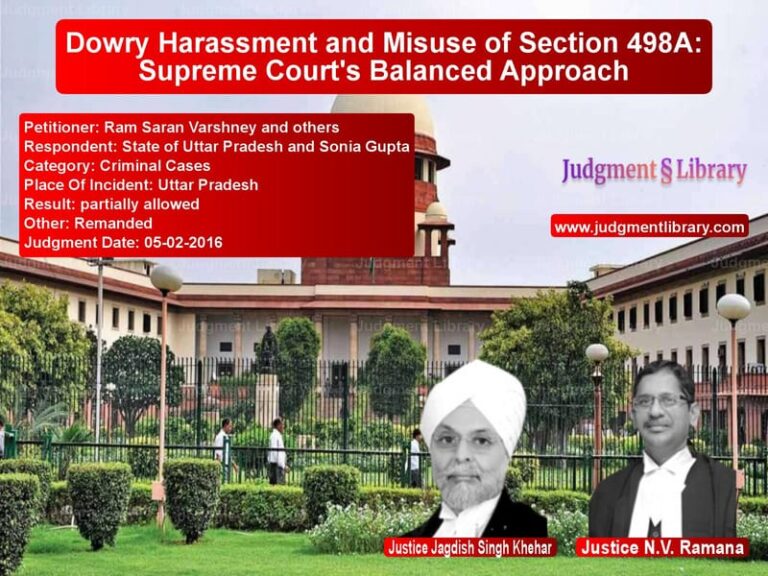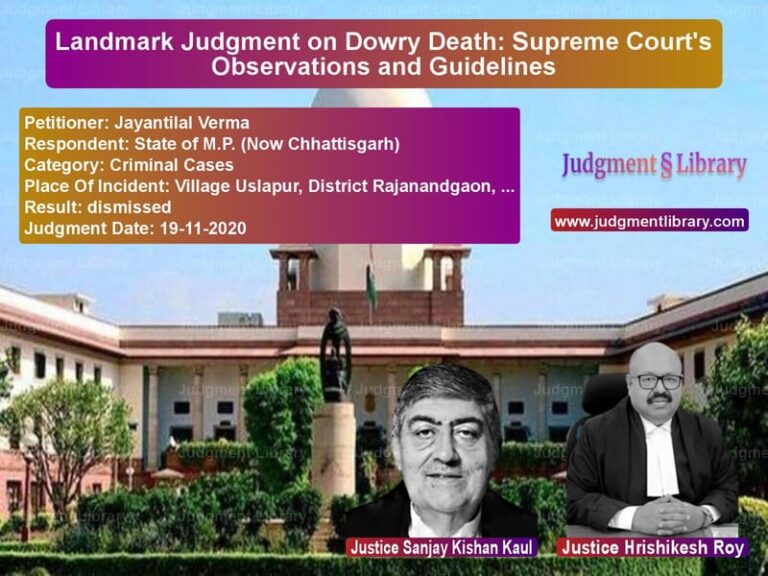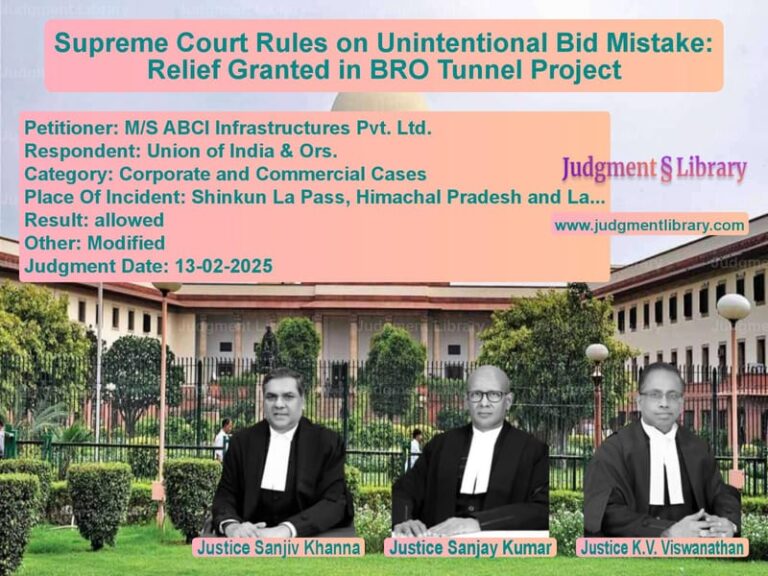Prison Overcrowding and Human Rights: Supreme Court’s Directive on Inhumane Conditions
The Supreme Court of India, in the case of Re – Inhuman Conditions in 1382 Prisons (II), delivered a landmark judgment on October 3, 2016, addressing the dire state of prison overcrowding and the violation of prisoners’ fundamental rights. The case was filed as a Public Interest Litigation (PIL) to highlight the miserable living conditions of inmates across 1382 prisons in India.
The Court, while emphasizing the need for humane treatment of prisoners, directed the Union and State governments to take urgent steps to alleviate overcrowding and ensure that inmates’ fundamental rights under Article 21 of the Constitution were upheld. This judgment is a crucial intervention in India’s criminal justice system, recognizing that prisoners, whether convicts or undertrials, retain their human rights.
Background of the Case
The PIL was filed to draw attention to the inhumane conditions prevailing in Indian prisons, particularly severe overcrowding. The Court had earlier issued directions on February 5, 2016, to reduce prison congestion and improve living conditions. However, when the matter was reviewed again in May and October 2016, it was evident that little progress had been made.
The key concerns raised were:
- Severe overcrowding, with some prisons operating at more than 150% capacity.
- Lack of basic hygiene and sanitation facilities.
- Failure of State authorities to implement measures for reducing prison populations.
- Absence of a proper legal framework to address the rights of undertrial prisoners.
Arguments Presented
Petitioners’ (Public Interest Litigants) Arguments
- Prisoners, including undertrials, are entitled to fundamental rights under Article 21 of the Constitution.
- Overcrowding has led to inhumane living conditions, posing health and safety risks.
- Despite previous orders, States had failed to take corrective action.
- The government should take immediate steps to construct additional prisons and ensure speedy trials for undertrials.
Respondents’ (Union and State Governments) Arguments
- Efforts were being made to improve prison infrastructure, but budgetary constraints delayed implementation.
- Some States had initiated measures to expedite trials and release undertrials.
- New prison facilities were under construction, but completion would take time.
Supreme Court’s Judgment
The Supreme Court, after reviewing the state of prisons across India, issued stringent directives. The key observations made by the Court included:
- On Overcrowding: The Court noted that overcrowding in prisons is a direct violation of human rights. States were directed to identify jails operating at more than 150% capacity and take immediate steps to reduce congestion.
- On Undertrial Review Committees: The Court expanded the mandate of the Undertrial Review Committees to consider cases of undertrials eligible for bail under various sections of the Criminal Procedure Code.
- On Construction of New Prisons: The States were directed to formulate a Plan of Action for constructing additional prison facilities and improving existing infrastructure.
- On Fundamental Rights of Prisoners: The Court reaffirmed that prisoners, including convicts and undertrials, have fundamental rights that cannot be ignored.
The Court stated: “Prisoners are entitled to all constitutional rights unless their liberty has been constitutionally curtailed. No iron curtain can be drawn between the prisoner and the Constitution.”
Legal Precedents Cited
The Court referred to key judgments reinforcing prisoners’ rights:
- Sunil Batra v. Delhi Administration (1978): Held that prisoners retain their fundamental rights, including dignity and humane treatment.
- Francis Coralie Mullin v. Administrator, Union Territory of Delhi (1981): Established that prisoners must be treated with dignity and provided adequate healthcare.
- D.K. Basu v. State of West Bengal (1997): Recognized custodial torture as a violation of Article 21 and laid down guidelines for the protection of prisoners.
Impact of the Judgment
The ruling is significant for prison reform in India:
- Urgent Need for Prison Reforms: The judgment highlights the State’s duty to improve prison conditions and ensure that inmates are treated humanely.
- Acceleration of Judicial Processes: The directive to expedite undertrial cases aims to reduce unnecessary detentions.
- Structural Improvements in Prisons: The ruling mandates the construction of new prisons and better management of existing facilities.
Conclusion
The Supreme Court’s judgment in Re – Inhuman Conditions in 1382 Prisons (II) is a crucial intervention in India’s prison system. It reiterates that prisoners retain their constitutional rights and cannot be subjected to inhumane treatment. The judgment also serves as a reminder to the State that prisons must not be treated as places of neglect but should be maintained in accordance with human rights standards.
The ruling sets the stage for long-overdue prison reforms, ensuring that the criminal justice system aligns with the principles of justice and human dignity.
Don’t miss out on the full details! Download the complete judgment in PDF format below and gain valuable insights instantly!
Download Judgment: Public Interest Liti vs Union of India & Sta Supreme Court of India Judgment Dated 03-10-2016.pdf
Direct Downlaod Judgment: Direct downlaod this Judgment
See all petitions in Fundamental Rights
See all petitions in Public Interest Litigation
See all petitions in Separation of Powers
See all petitions in Judgment by Madan B. Lokur
See all petitions in Judgment by R K Agrawal
See all petitions in allowed
See all petitions in supreme court of India judgments October 2016
See all petitions in 2016 judgments
See all posts in Constitutional Cases Category
See all allowed petitions in Constitutional Cases Category
See all Dismissed petitions in Constitutional Cases Category
See all partially allowed petitions in Constitutional Cases Category







